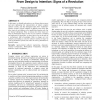Free Online Productivity Tools
i2Speak
i2Symbol
i2OCR
iTex2Img
iWeb2Print
iWeb2Shot
i2Type
iPdf2Split
iPdf2Merge
i2Bopomofo
i2Arabic
i2Style
i2Image
i2PDF
iLatex2Rtf
Sci2ools
WOA
2001
2001
From Design to Intention: Signs of a Revolution
In this paper, we identify and analyze a set of issues that are more and more influencing the characteristics of today's complex software systems, and that distinguish them from "traditional" software systems. Several examples in different areas show that these issues do not influence a few application domains only, but are instead widespread. Then, we discuss how these issues are likely to dramatically impact on the very way software is modeled and engineered. In particular, we show that we are on the edge of a revolutionary shift of paradigm, likely to change our very attitudes, and making us conceive software systems no longer in terms of mechanical systems, but rather in terms of intentional or physical systems.
| Added | 31 Oct 2010 |
| Updated | 31 Oct 2010 |
| Type | Conference |
| Year | 2001 |
| Where | WOA |
| Authors | Franco Zambonelli |
Comments (0)

